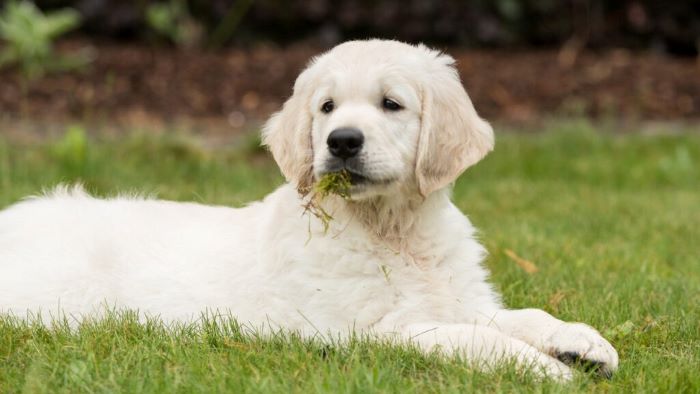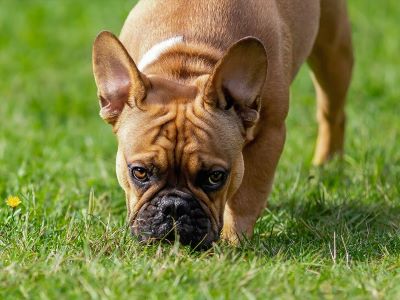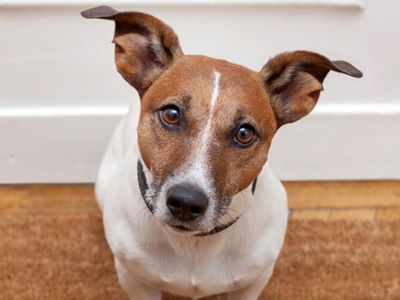If you have a dog, you may have noticed that sometimes they act like cows 🐄 and graze on the grass🌱. You may wonder what is going on in their furry heads. Are they bored, hungry, sick, or just curious? Do they need more fibre, vitamins, or minerals in their diet? Do they enjoy the fresh and crunchy taste of greenery? Or are they trying to get rid of something that is bothering their stomach?

Dogs are known to be carnivores, but they also have some omnivorous traits. They can digest plant matter to some extent, and they may have evolved to eat grass as a survival strategy in times of food scarcity. Grass-eating is a common and natural behaviour in dogs, and it may have various reasons and effects.
Let us explore the possible explanations and implications of grass-eating behaviour in dogs and provide some tips on how to deal with it. So, keep reading and learn more about your dog’s grass-eating habits.
Why Do Dogs Eat Grass?
The behaviour of eating strange non-food items is known as pica. In humans, pica may be associated with dietary deficiency like any particular vitamin or mineral. However, in the case of dogs 🐶 nutritional deficiency might not be the only reason for eating grass.

Upset Stomach
Many dogs suffer from an upset or inflamed stomach. When they feel like having digestion problems they will return to grass. So in that way eating grass serves as a biological purpose for some dogs. There is a myth that dogs vomit after eating grass.
Well, the reason behind it is that dogs eat grass to eliminate whatever is bothering them. So, if your dog vomits after eating grass and is fine now then there is nothing to worry about.[1]
More Fibre
A dog needs fibre for better digestion and regulating stool pass 💩. However, if their current diet lacks a sufficient amount of fibre then dogs will rely on other sources. The grass is a good source of fibre and thus dogs eat it to meet their fibre requirement.
As mentioned by the Americal Kennel Club, “Fibre can help regulate your dog’s bowels, preventing constipation and loosening poop. When they aren’t getting enough fibre, dogs have trouble pooping, and adding the right amount of fibre can help them poop regularly.“
If you find your dog eating grass 🌱 from the lawn then probably he might be having fibre deficiency. Your dog may ingest grass to help regulate their bodily functions.
Nutritional Deficiency
To maintain a healthy lifestyle, just like humans, dogs too need healthy 🍽️ nutritious food. It is difficult for paw parents 🐾 to completely meet the nutritional requirements of their Fido. Thus, to complete the nutritional gap and balance the diet, dogs eat grass.
If you suspect any nutritional deficiency in your dog, it is better to take him to a vet. The vet 👩⚕️ will check for dietary needs and give a balanced feeding schedule for your dog.
Anxiety
Many dogs suffer from anxiety 😢, whether it is separation anxiety or social anxiety. Dogs have a self-soothing capacity and to do so they might eat grass as a coping mechanism. If your dog is having anxiety then such behaviour can be treated through behavioural modification.

Apart from this, other signs of anxiety are:
- Destructive behaviour
- Drooling
- Ears pulled down or back
- Excessive barking
- Licking lips
- Panting
- Shaking
- Whining
Boredom
You might have seen your dog chewing 🦴 or destroying toys whenever he gets bored. They may eat anything out of boredom or to get your attention. In the same way, they might eat grass to relieve boredom.
On the other hand, they might also want to grab your attention to play in the outdoors with your dog. Dogs are also smart. If they notice they receive more attention from their owner every time they eat grass, it can quickly become a behaviour they develop to seek even more attention.
Is Eating Grass Bad for Dogs?
Eating grass is not necessarily bad for dogs, as long as the grass is clean and free of pesticides 🤢 or toxic plants. Some experts believe that eating grass may have some benefits for dogs. It can provide fibre and roughage to aid digestion and bowel movements 💩, help to expel intestinal parasites or worms and supplement their diet with vitamins, minerals and antioxidants.
However, dog urine can damage artificial grass and require a special cleaner. Be sure to rinse real or artificial grass after your dog urinates and use the best artificial grass cleaner for dog urine.
However, eating grass may also have some risks for dogs, such as:
- Causing vomiting, diarrhoea or abdominal pain
- Ingesting harmful substances or foreign objects that can damage their mouth, throat or stomach
- Triggering allergic reactions or skin irritations
- Indicating an underlying medical condition that needs veterinary attention
Therefore, it is important to monitor your dog’s grass-eating behaviour and check for any signs of distress or discomfort. If your dog eats grass 🌱 frequently or excessively or shows any symptoms of illness or weight loss, you should consult your veterinarian to rule out any serious health issues.
How Do I Stop My Dog From Eating Grass?
If you want to stop your dog from eating grass, you need to understand the possible causes 💡 and motivations behind his behaviour.

Here are some prevention and treatment strategies that can help you stop your dog from eating grass:
- Provide your dog with a balanced and complete diet that meets their nutritional requirements 🥕 and preferences. You can consult your veterinarian or a pet nutritionist to determine the best food for your dog.
- Offer your dog healthy snacks or treats 🍪 that can satisfy their appetite and taste buds. You can give them fruits, vegetables or herbs that are safe and beneficial for dogs.[2] You can also give them dental chews, rawhide bones, or bully sticks that can keep their teeth clean and their jaws busy.
- Ensure your dog gets enough exercise 🏋️♂️ and mental stimulation that can keep them fit and happy. You can take them for walks, runs, hikes or bike rides that can burn off their excess energy and calories. You can also play with them, train them, or teach them new tricks that can challenge their mind and skills.
- Address any medical or behavioural issues that may cause your dog to eat grass. You can take your dog to the veterinarian 👩⚕️ for a regular check-up and diagnosis. You can also use positive reinforcement or counterconditioning techniques to help your dog overcome any fears or anxieties that may cause them to eat grass.
- Monitor your dog’s grass-eating behaviour and intervene when necessary. You can keep an eye on your dog when they are outside and redirect their attention ⏱️ when they approach the grass. You can also use a leash, a muzzle, or a spray bottle to prevent them from eating the grass.
- You can also use a fence, a net, or a cover to protect your lawn or garden from your dog’s grass-eating habits and urine damage. This prevents the grass from being killed by the compounds in dog pee, which answers the question – why does dog pee kill grass? You can also reward your dog with praise 👏, affection, or treats when they ignore or avoid the grass.
FAQs
Should I let my dog eat grass?
You need not worry if your dog does not get sick after occasionally eating the grass. In fact, behaviour modification may interfere with natural instincts and do more harm than good.
Do dogs eat grass when they are sick?
Although it’s a common belief that dogs eat grass (or other plants) when they feel sick or to induce vomiting, evidence suggests that this is not the case. There might be other causes due to which a dog might eat grass which also includes boredom and anxiety.
Does grass help a dog’s stomach?
Eating grass may be an easy way for your pooch to add roughage to their diet, helping to keep their digestive tract flowing. That said, if your dog is eating grass but also showing signs of stomach upset, there may be a medical problem.
Can dogs eat grass every day?
If your dog is occasionally eating grass, there is likely no cause for concern. If your dog is eating grass excessively or obsessively, leading to repeated vomiting and diarrhoea, then it’s time to call your vet. Other signs include vomiting and/or diarrhoea that persist for over 24 hours.
Wrapping Up
Grass-eating is a common and natural behaviour in dogs and it may have various causes and consequences. Some dogs may eat grass to relieve gastrointestinal discomfort, satisfy their nutritional needs, fulfil their natural instincts or simply because they like the taste or texture.
Grass-eating may not pose a serious health risk for dogs, as long as the grass is clean and free of pesticides or toxic plants. However, if your dog eats grass 🌱 excessively or compulsively, or shows signs of vomiting, diarrhoea or weight loss, you should consult your veterinarian to rule out any underlying medical conditions.
You can also try to prevent or reduce grass-eating by providing your dog with a balanced diet 🍽, adequate exercise, mental stimulation and alternative chewing options. By understanding and managing your dog’s grass-eating behaviour, you can ensure their health and happiness.🐾🐶
If you need to seed new grass, be sure to follow the tips on “how long to keep dog off grass after seeding” to allow proper germination and growth
References:
- Candido, M. V., Syrjä, P., Hanifeh, M., Lepajoe, J., Salla, K., Kilpinen, S., Noble, P. J. W., & Spillmann, T. (2021). Gastric mucosal pathology by Acta Veterinaria Scandinavica.
- Dacvim, D. E. L. D. M. (2023b, May 11). What Nutrients are Essential for My Pet? Clinical Nutrition Service at Cummings School.



